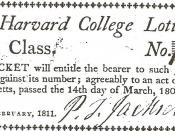The Sociology of Lotteries "The lottery is one of the oldest forms of gambling, taking its name from the word 'lot' which refers to an object used in deciding a matter of chance." (Sullivan, 1972: 4) In Canada the federal and provincial governments have become proactive participants in the gambling industry. The activity itself is no longer called "gambling" but is now commonly referred to as "gaming" as the industry needed a makeover to attain respectability. Gaming connotes amusement or entertainment whereas gambling may have unsavoury, if not illegal, associations. In Canada, in 1998, government lottery tickets were purchased in 74 percent of Canadian households and the average household expenditure on government lottery tickets was $239 (Harris, 1999: 37).
Government run lotteries are relatively new to Canada. In 1969 Parliament amended the Criminal Code of Canada to permit both the federal and provincial levels of government to hold lotteries. These first lotteries were sponsored by the federal government but it was not long before the provincial governments lobbied Ottawa for exclusive rights to lottery revenue.
Advertisements tell us to "spend a dollar" and win millions. The odds are staggering, but you could be that one person that wins. Looking at lotteries from sociological viewpoints, how do the structural functionalist, conflict, and symbolic interactionist perspectives analyze and explain government run lotteries? By examining each perspective from a sociological viewpoint I will argue that the conflict perspective provides the best explanation of this issue. To establish this we must also examine how the functionalist and symbolic interactionists view lotteries.
What functions do lotteries exercise within a society? The functionalists' perspectives are based on the assumption that society is a stable orderly system and that all societies must make provisions for meeting communal needs in order to survive. Talcott Parsons, one of the...


